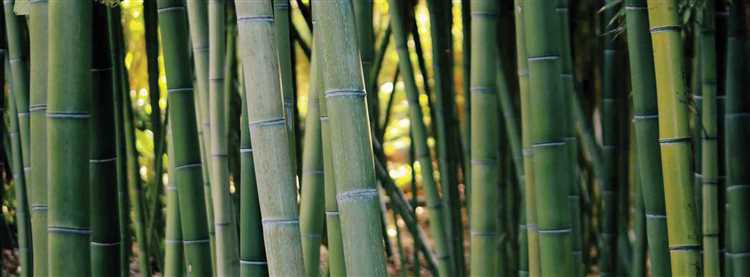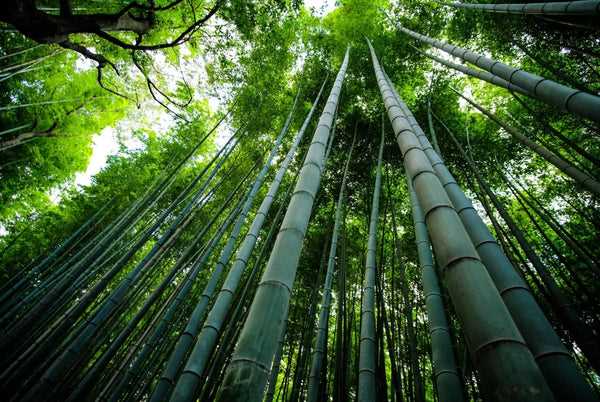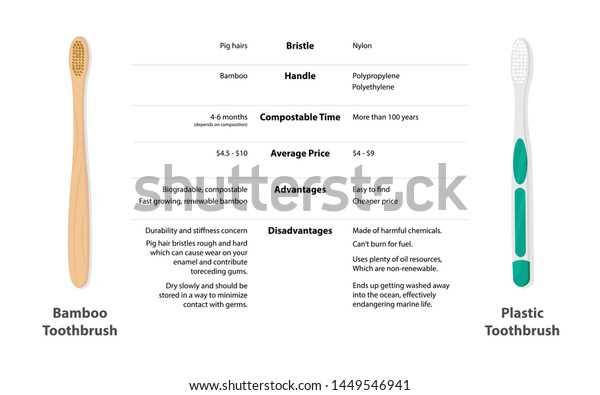
Plastic has long been a popular material for various products due to its cheapness and versatility. However, as our society becomes more environmentally conscious, the drawbacks of plastic are becoming increasingly evident. That’s where bamboo comes in – a sustainable and eco-friendly alternative that is gaining popularity in many industries.
One of the main reasons why bamboo outperforms plastic is its renewable nature. Unlike plastic, which is made from non-renewable fossil fuels, bamboo is a fast-growing grass that can be replenished much more quickly. This makes bamboo a more sustainable option, as it can be harvested without causing long-term damage to the environment.
In addition to being renewable, bamboo also has a much smaller carbon footprint compared to plastic. The production of plastic requires the extraction and processing of fossil fuels, which releases significant amounts of greenhouse gases into the atmosphere. On the other hand, bamboo absorbs carbon dioxide and releases oxygen into the air, making it a natural carbon sink.
Furthermore, bamboo is a highly versatile material that can replace plastic in a wide range of applications. From cutlery and food containers to packaging materials and even construction materials, bamboo can be used to create sustainable alternatives that are just as functional as their plastic counterparts. Not only does this reduce our dependence on plastic, but it also helps to reduce the amount of plastic waste that ends up in landfills and oceans.
In conclusion, bamboo is a superior choice to plastic for several reasons. Its renewable nature, smaller carbon footprint, and versatility make it an ideal substitute for plastic in various industries. By choosing bamboo over plastic, we can help protect the environment and create a more sustainable future for generations to come.
- Benefits of choosing bamboo over plastic
- Environmental superiority
- Biodegradability and sustainability
- Versatility and strength
- Construction
- Fashion and Accessories
- Health and safety advantages
- Aesthetically pleasing
- Cost-effectiveness and long-term savings
- Sustainable and eco-friendly materials
- Aesthetically pleasing and versatile
- Questions and answers
- Why is bamboo considered superior to plastic?
- What are the environmental benefits of using bamboo instead of plastic?
- Is bamboo a more cost-effective material compared to plastic?
- Are there any disadvantages to using bamboo instead of plastic?
- Can bamboo products replace all plastic products?
Benefits of choosing bamboo over plastic
Bamboo is rapidly gaining popularity as an eco-friendly alternative to plastic due to its numerous benefits:
1. Sustainability: Bamboo is a highly renewable resource that grows incredibly fast. Compared to the slow-growing trees used for wood products, bamboo can be harvested in just a few years, making it a sustainable choice.
2. Durability: Despite its lightweight and flexible nature, bamboo is remarkably strong and durable. It can withstand daily wear and tear, making it a long-lasting material.
3. Biodegradability: Unlike plastic, which takes hundreds of years to decompose, bamboo is biodegradable. When disposed of, it naturally breaks down into the soil without leaving a harmful trace.
4. Versatility: Bamboo is a versatile material that can be used in various applications, including furniture, household items, and even clothing. Its versatility makes it a viable alternative to plastic in a wide range of products.
5. Carbon footprint: Growing bamboo absorbs a significant amount of carbon dioxide and releases oxygen into the atmosphere, helping to reduce the carbon footprint. This makes bamboo a valuable tool in combating climate change.
6. Antibacterial properties: Bamboo naturally possesses antimicrobial properties, making it resistant to bacteria and fungi. This makes it suitable for kitchenware, as it discourages the growth of harmful microorganisms.
7. Aesthetics: Bamboo’s natural look and warm color give it a timeless and elegant appearance. Choosing bamboo over plastic can add a touch of beauty to your everyday items.
8. Eco-friendly manufacturing: The production of bamboo products requires less energy and water compared to plastic. It is also free from toxic chemicals, making it a safer option for both the environment and human health.
By choosing bamboo instead of plastic, we can contribute to a greener planet and reduce our impact on the environment. The benefits of bamboo make it a clear winner in the battle against plastic waste.
Environmental superiority
Bamboo has several environmental advantages over plastic:
- Renewable resource: Bamboo is a highly renewable resource. It is one of the fastest-growing plants in the world, with some species growing up to 39 inches in just 24 hours. This rapid growth rate makes it a more sustainable alternative to plastic, which is made from fossil fuels.
- Biodegradable: Unlike plastic, bamboo is biodegradable. When discarded, bamboo products will break down over time and return to the earth, leaving behind minimal waste. In contrast, plastics can take hundreds of years to decompose, contributing to pollution and waste accumulation.
- Low carbon footprint: Bamboo has a significantly lower carbon footprint compared to plastic. As a plant, bamboo absorbs carbon dioxide from the atmosphere and releases oxygen, helping to mitigate climate change. Additionally, the production of bamboo products requires less energy and emits fewer greenhouse gases compared to plastic production.
- Sustainable farming practices: Bamboo can be cultivated without the use of pesticides or fertilizers, making it a more environmentally friendly option compared to conventional farming practices used for plastic production. Moreover, bamboo forests help to prevent soil erosion and provide habitats for various animal species.
- Minimal water usage: Bamboo requires relatively less water compared to other crops commonly used for manufacturing materials such as cotton. This makes it a more sustainable option, especially in regions where water scarcity is a concern.
Considering these factors, choosing bamboo over plastic can contribute to a healthier environment and a more sustainable future.
Biodegradability and sustainability
One of the key advantages of bamboo as a material is its biodegradability and sustainability. Unlike plastic, which can take hundreds of years to decompose, bamboo is a highly sustainable and rapidly renewable resource. Bamboo can be grown and harvested in just a few years, making it a much more eco-friendly alternative to plastic.
Bamboo is also biodegradable, meaning that it can naturally break down and decompose without leaving harmful residues in the environment. When bamboo products are disposed of, they can be composted or left to decompose naturally, returning to the Earth without causing any harm to the planet.
Furthermore, bamboo production requires significantly less water and energy compared to plastic manufacturing. Bamboo plants are known for their ability to absorb large amounts of carbon dioxide from the atmosphere, making them an effective tool in combating climate change.
By choosing bamboo products over plastic, individuals can make a positive impact on the environment. The use of biodegradable and sustainable materials like bamboo helps to reduce plastic pollution, conserve resources, and promote a healthier planet for future generations.
Versatility and strength
Bamboo is an incredibly versatile material that offers a wide range of applications. From construction to fashion, it can be used in various industries due to its impressive strength and durability.
When compared to plastic, bamboo stands out because of its superior strength. It has a higher tensile strength than many types of plastic, meaning it can resist more force before breaking or deforming. This makes it an ideal choice for products that require durability and longevity.
In addition to its strength, bamboo is also highly versatile. It can be shaped and molded into different forms, allowing for endless design possibilities. Whether it’s used for furniture, packaging, or even as an alternative to traditional building materials, bamboo can be adapted to meet various needs.
Construction
Bamboo’s strength and versatility make it an excellent choice for construction purposes. It can be used as a sustainable alternative to timber, offering similar structural benefits. Bamboo is known for its high flexural strength, which means it can withstand heavy loads without breaking. This makes it an ideal material for beams, columns, and flooring.
Fashion and Accessories

Bamboo is also making its way into the fashion industry, thanks to its versatility. It can be woven into fabrics to create lightweight, breathable, and sustainable clothing. Additionally, bamboo accessories such as sunglasses, watches, and jewelry have gained popularity due to their unique and eco-friendly appeal.
Overall, the versatility and strength of bamboo make it a superior choice when compared to plastic. Its ability to withstand force, its adaptability for different applications, and its sustainability make it an excellent alternative material in various industries.
Health and safety advantages
Bamboo products have a number of health and safety advantages over plastic.
- Non-toxic: Unlike plastic, bamboo is a natural material that does not contain any harmful chemicals or toxins. This makes it a safer option for food and drinks, as it does not leach any harmful substances.
- Antimicrobial properties: Bamboo is naturally antimicrobial, which means it has the ability to resist the growth of bacteria and other harmful microorganisms. This makes bamboo products more hygienic and reduces the risk of food contamination.
- Heat resistance: Bamboo has a higher heat resistance compared to plastic, making it a safer option for hot beverages and food items. It is less likely to warp or release harmful chemicals when exposed to high temperatures.
- Sturdiness: Bamboo products are generally more durable and sturdy than plastic, reducing the risk of accidents and injuries from breakage or sharp edges.
- Biodegradable: When compared to plastic, which takes hundreds of years to decompose, bamboo is a biodegradable material that naturally breaks down in a shorter period of time. This reduces the environmental impact and potential harm to wildlife.
Overall, choosing bamboo over plastic can be a healthier and safer choice for both individuals and the environment.
Aesthetically pleasing
Bamboo products have a natural and rustic look that is aesthetically pleasing. The unique patterns and textures of bamboo give it a distinctive and stylish appearance. Unlike plastic, which is often mass-produced and uniform in appearance, bamboo products have a more organic and handmade feel.
Furthermore, bamboo is versatile and can be molded into different shapes and designs, allowing for a wide range of creative and eye-catching products. From bamboo utensils to furniture and home decor items, there is a diverse range of options to choose from.
Additionally, the natural color of bamboo adds warmth and elegance to any space. It blends well with various interior styles, be it modern, rustic, or minimalistic. Whether it is a bamboo cutting board in the kitchen or a bamboo toothbrush in the bathroom, these products can enhance the overall aesthetic of your home.
In contrast, plastic products often lack the natural beauty and charm that bamboo possesses. Their synthetic and often bright colors can appear cheap and unappealing. The visual appeal of bamboo products makes them a popular choice for individuals who value both functionality and style.
By using bamboo products instead of plastic, you can not only reduce your environmental impact but also enhance the visual appeal of your surroundings. The natural beauty and versatility of bamboo make it a superior choice for those who seek aesthetically pleasing and eco-friendly alternatives.
Cost-effectiveness and long-term savings
When comparing the cost of bamboo and plastic products, it is clear that bamboo offers a more cost-effective solution. While plastic products may initially seem cheaper, their short lifespan and frequent need for replacement make them a costly choice in the long run.
Bamboo, on the other hand, is known for its durability and longevity. It can withstand heavy usage and regular wear and tear without losing its functionality or aesthetic appeal. This means that bamboo products, such as bamboo utensils or bamboo toothbrushes, provide long-term savings as they do not need to be replaced as frequently as plastic alternatives.
Moreover, the production process of bamboo products is relatively inexpensive. Bamboo is a fast-growing and renewable resource, making it more readily available and less costly to harvest and manufacture than plastic. This cost-effectiveness is further enhanced by the fact that bamboo is often sourced locally, reducing transportation and shipping costs.
Sustainable and eco-friendly materials

In addition to being cost-effective, bamboo outperforms plastic in terms of sustainability and environmental impact. Bamboo is a highly renewable and biodegradable material, which means that its production and disposal have minimal consequences for the environment. On the other hand, plastic products are notorious for their detrimental effects on ecosystems and contribute to the global plastic pollution crisis.
Bamboo is also a more eco-friendly alternative to plastic because it requires fewer resources and energy to produce. The production of plastic products, on the other hand, is highly energy-intensive and heavily relies on fossil fuels. Choosing bamboo over plastic helps to reduce carbon emissions and lessen the dependence on non-renewable resources.
Aesthetically pleasing and versatile
Bamboo products are not only cost-effective and sustainable but also aesthetically pleasing. Bamboo has a natural and warm appearance that adds a touch of elegance to any setting. Whether it is bamboo cutting boards, bamboo furniture, or bamboo flooring, these products can enhance the visual appeal of any space.
Furthermore, bamboo is a versatile material that can be used in various forms and applications. It can be molded, laminated, and shaped into different designs and structures, allowing for a wide range of possibilities in terms of product development and innovation.
In conclusion, the cost-effectiveness, long-term savings, sustainability, and versatility of bamboo make it a superior choice to plastic. By opting for bamboo products, individuals can minimize their environmental impact, support a sustainable industry, and enjoy the benefits of a durable and aesthetically pleasing material.
Questions and answers
Why is bamboo considered superior to plastic?
There are several reasons why bamboo is considered superior to plastic. Firstly, bamboo is a renewable resource that grows much faster than trees, making it more sustainable. Additionally, bamboo products are biodegradable, while plastic takes hundreds of years to break down. Bamboo also has natural antibacterial properties, making it more hygienic than plastic. Finally, bamboo is stronger and more durable than plastic, making it a better long-term investment.
What are the environmental benefits of using bamboo instead of plastic?
Using bamboo instead of plastic has numerous environmental benefits. Bamboo is a highly renewable resource that can be harvested and regrown within a few years, unlike trees which can take decades to replenish. Bamboo also absorbs a significant amount of carbon dioxide and releases oxygen, helping to mitigate climate change. Additionally, bamboo products are biodegradable and do not contribute to the growing problem of plastic pollution in our oceans and landfills.
Is bamboo a more cost-effective material compared to plastic?
While the initial cost of bamboo products may be slightly higher than plastic products, bamboo is actually more cost-effective in the long run. Bamboo is a durable material that can withstand frequent use and last for years without showing signs of wear and tear. Plastic, on the other hand, is prone to cracking, fading, and breaking over time, leading to the need for frequent replacements. By investing in bamboo products, you can save money in the long term and avoid contributing to plastic waste.
Are there any disadvantages to using bamboo instead of plastic?
While bamboo is generally considered superior to plastic, there are a few disadvantages to using bamboo. Firstly, bamboo products may not be as widely available as plastic products, especially in certain regions or industries. Additionally, some bamboo products may require special care or maintenance to ensure their longevity. Lastly, the production of bamboo products may require more energy and resources compared to the production of plastic products, although the overall environmental impact is still significantly lower.
Can bamboo products replace all plastic products?
While bamboo products offer a more sustainable alternative to plastic, they may not be able to replace all plastic products in every situation. Certain plastic products, such as medical equipment or specialized industrial components, may require specific properties that cannot be easily replicated with bamboo. However, for everyday items like utensils, household goods, and packaging materials, bamboo can certainly serve as a viable and eco-friendly alternative to plastic.